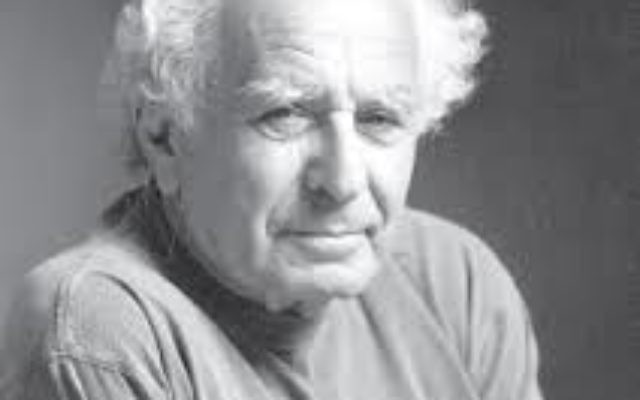Retaliation Is Wrong Response to New Intifada
By Eugen Schoenfeld
Events in Israel in the month of Cheshvan have conformed to the nickname mar Cheshvan, the bitter month of Cheshvan.
Israel is facing a bitter month; not only are Jews are being attacked and killed, but so are Palestinians. Some years ago, while I would have sympathized with the deaths of Palestinians, I would have added, as so many Jews do, “They started it.”
Isn’t this a justification for brawls by high school kids? He started it, and I merely defended myself. That justification doesn’t resolve hostilities.
As a Holocaust survivor, I can understand the desire to hit back. Ask any survivors how they felt after liberation, and they’ll mention the desire to hit back. But we did not.
On May 2, 1945, I was chatting with Lt. Schwartz, who commanded a tank, and few other soldiers who liberated me from Muhldorf Wald Lager. The chief capo of the camp, a mean-spirited German murderer, walked by. I told the lieutenant of the beatings and torture the capo had inflicted on my fellow Jews and myself.
The lieutenant handed me his Colt pistol and told me: “Shoot that SOB. Nothing will happen to you.”
But I could not take a life. It would have been against my Jewish upbringing. Instead, I asked the lieutenant to arrest him and let the courts decide his fate.
The history of the Jewish people from the fourth century C.E. on is full of unjust physical and mental attacks inflicted by the Christian world. We were forced to restrain ourselves from counterattacks, lest the killing and the torture increase.
One of the first things I was taught is the adage “Do not open Satan’s mouth,” meaning don’t give our enemies a reason to increase the punishments. Remember Egypt of old: Whenever Jews complained about the harshness of their life and their treatment, the punishment increased. As the haggadah informs us, “They made our lives bitter.”
For a long time, we transferred the task of taking revenge to the prophet Elijah. On Passover, we open the front door to welcome Elijah into our midst and beg him to pour out his wrath on our enemies.
To me as a boy of 14, this seder ritual was hardly satisfying. I joined the Betar movement and began to believe in the power and glory of revenge. The Betar Hymn told us that for ages enough of our blood had been shed from Dan to Beersheva and from Gilead to the sea. Our land (Israel) had been soaked by Jewish blood. It was time that we stood up to defend the land and ourselves.
The rejection of meekness has become more dominant in post-Diaspora Jewish political philosophy. We renounce unquestioned submission as a people who previously were led like sheep to slaughter.
I believe that the rejection of the old response began during the Holocaust with the Warsaw Ghetto rebellion and the formation of Jewish partisan groups. Like the children born in the desert to freed Egyptian slaves, we accepted the motto eyn breyrah (we have no choice), and we fought for our freedom and dignity.
We paid a great price for standing up. In 1944 I saw what the Germans did to the Warsaw Ghetto. I was brought to the concentration camp established in the center of the former ghetto on Novolipki Street. I worked in the destroyed buildings. The German devastation of the ghetto was in its own way greater than what the atomic bomb did to Hiroshima.
Israeli wars have shown the world that Jews can be and are heroic and great warriors. Israel no longer needs to prove its capability to wage war to defend its right to exist as a free society.
Perhaps it is time that we prove Israel’s capability as a seeker of peace. Are we not the children of Aaron, who, according to Midrashim, was the epitome of a peace seeker? The great moral nature of Judaism is that it advocates equally braveness in battle and in peace seeking and values human life for its own sake.
When G-d defeated the Egyptians by drowning their army in the Red Sea, the angels in heaven sang and rejoiced. G-d chastised the angels: My children are dying in the sea, and you rejoice?
Isn’t it time to follow G-d’s nature of being slow to anger and easy to appease? Isn’t this the value that we should emulate? Isn’t it time to give up war and extend the olive branch instead of the bayonet?
Isn’t it time to stop emphasizing power and start emphasizing spirit?
Current events in Israel make me anxious for the future of the Jewish people and Israel. I am disturbed not only by the frequency of hostilities, but more important by their form.
Young Palestinian Muslims are using knives. Guns and rockets, while troublesome, indicate far lesser anger and a less personal response than knives. The greater the distance between the aggressor and the victim, the less personal is the hostility.
When one uses a knife, the relationship between the aggressor and the victim is extremely personal. Often as you slash or stab a victim, you see his face, hear his agony, hear his cry for help. This mode of killing points to bitterness and heightened anger.
I am concerned that the Palestinians have entered the state of hopelessness and, as Israelis did earlier, have assumed a perspective of eyn breyrah: no other choice.
Responding to an attack with aggression merely leads to increased aggression. My mother (of blessed memory) would always interfere in my sibling fights, reminding me that as the older and wiser sibling, I should stop the cycle. I similarly hope that at one point, and I hope it is soon, Israel will assume the wiser stance and seek accommodation rather than retaliation.




comments